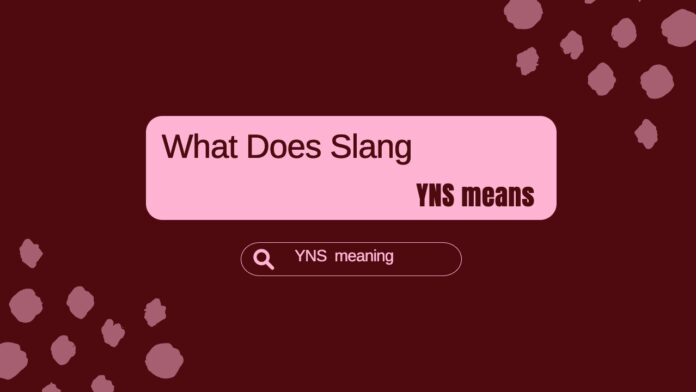In online communication, acronyms and slang are commonly used to save time and simplify conversations. One such acronym that has recently gained popularity is “YNS.” While it may seem cryptic to those unfamiliar with it, the meaning of YNS can vary depending on the context in which it is used. We will explore this term’s meanings, origins, and common uses to better understand it.
Table of Contents
Toggle1. YNS: Your Next Step
In certain contexts, particularly in motivational or personal development spaces, “YNS” stands for Your Next Step. This usage is commonly seen in conversations about setting goals or taking actions toward personal growth. The phrase emphasizes the importance of thinking about what comes next in one’s journey, whether it’s in business, self-improvement, or other areas of life.
- Example: “What’s YNS after completing this project? Let’s focus on growing the team.”
This interpretation encourages individuals to remain forward-focused and to always consider the next move or decision, especially when it comes to achieving long-term success.
2. YNS: Yes
Another common meaning of YNS, especially in casual conversations, is simply Yes. In this case, it serves as a shorthand for agreement or affirmation, often used in online chats or social media platforms. It’s an abbreviated form of the more traditional “yes,” saving time and space when responding to a question or making a positive statement.
- Example:
- Person 1: “Are you coming to the party tonight?”
- Person 2: “YNS!”
This interpretation of YNS is widely used in various online platforms, such as texting, forums, and comment sections. It simplifies communication, particularly when the response is clear-cut and does not require further explanation.
3. YNS: You Never Said
In some online conversations, YNS is used as an abbreviation for You Never Said. This usage typically comes up when someone is pointing out that the other person failed to mention something in a prior conversation, usually with a tone of mild frustration or emphasis.
- Example: “YNS that we had a meeting scheduled for today!”
This interpretation implies that something important was omitted or neglected in communication, leading to confusion or misunderstanding. It’s a useful shorthand in online chats where brevity is key, especially when discussing situations involving missed details or unspoken expectations.
4. YNS: Your Name’s Shortened
In some cases, particularly among younger generations or close-knit social circles, YNS is used to refer to a nickname or shortened form of someone’s name. It’s a playful or informal way to reference someone by their initials or a customized version of their name.
- Example: “I just called Sarah YNS, she likes it better than her full name.”
While this usage of YNS isn’t as widespread, it’s prevalent among certain groups or individuals who prefer to use initials or shortened names as a form of affection or casual address.
5. YNS: Young New Star
Another interpretation of YNS is Young New Star, often used in the entertainment industry to refer to up-and-coming talents or rising stars. This term is particularly common in celebrity news, music, movies, and sports. It’s a term of endearment for someone who is expected to achieve great things in their respective field.
- Example: “She’s a YNS in the world of fashion. Watch her rise!”
This meaning is used to highlight someone’s potential and the belief that they are on the verge of becoming a significant figure in their industry.
6. YNS: You’re Not Special
A less positive meaning of YNS is You’re Not Special, which is often used sarcastically or dismissively. It can be intended to put someone down or remind them that they are not unique or extraordinary, especially when they may be acting entitled or overly self-important.
- Example: “Just because you got one good grade, YNS. Don’t act like you’ve changed the world.”
This usage can be seen in online trolling or negative discourse, where one person attempts to minimize the accomplishments or status of another.
7. YNS in Popular Culture and Social Media
Social media platforms like Instagram, TikTok, Twitter, and Snapchat have made acronyms like YNS widely used across various communities. Young users, in particular, are quick to adopt and popularize new slang terms. The meanings of acronyms can vary, and they often shift depending on the trends or context at the time.
On platforms like TikTok, for example, the meaning of YNS might shift rapidly from one usage to another, depending on the latest viral trend or meme. While some users might interpret it as “Your Next Step,” others may see it as an expression of affirmation or disagreement.
8. How to Use YNS in Conversations
To effectively use YNS in conversations, it’s crucial to understand the context and the group you’re communicating with. Here are some tips on how to use YNS properly:
- Stay Context-Aware: If you’re communicating with someone familiar with the term, it’s easy to drop an acronym like YNS without confusion. However, if you’re unsure of the person’s familiarity with the term, it’s best to provide clarification or avoid abbreviations that may be misinterpreted.
- Use it Sparingly: Acronyms like YNS are great for quick, casual conversations, but overuse can make your communication unclear or repetitive. Use it to add flavor and efficiency to your messages, but don’t let it take over your vocabulary.
- Know the Audience: YNS might be understood differently depending on who you’re talking to. If you’re chatting with a friend who loves motivational speak, “Your Next Step” might be a great fit. If you’re texting someone in a more casual setting, “Yes” may be a better option.
Conclusion
YNS is a versatile acronym that can have multiple meanings depending on the context in which it is used. Whether it stands for “Your Next Step,” “Yes,” “You Never Said,” or something entirely different, the acronym is part of the evolving landscape of online communication. As with all slang, it’s important to understand the context and the people you’re interacting with to ensure your message is conveyed as intended. Acronyms like YNS help make our digital conversations faster and more efficient, but they also reflect the ever-changing nature of language in the online world.














